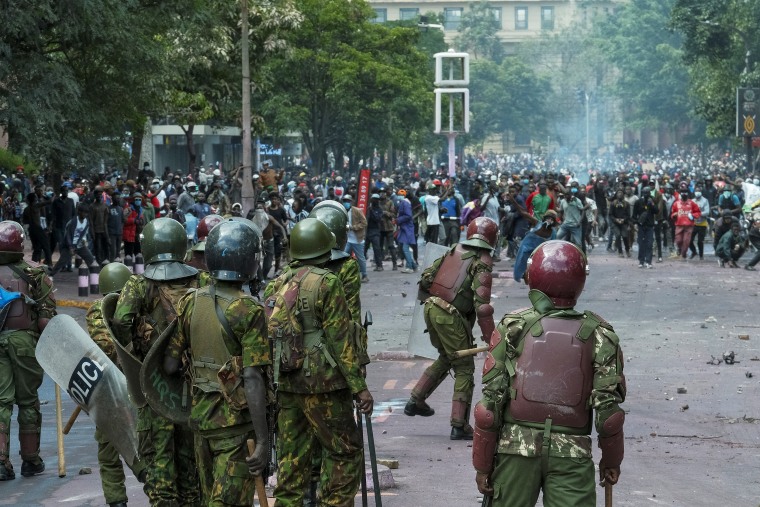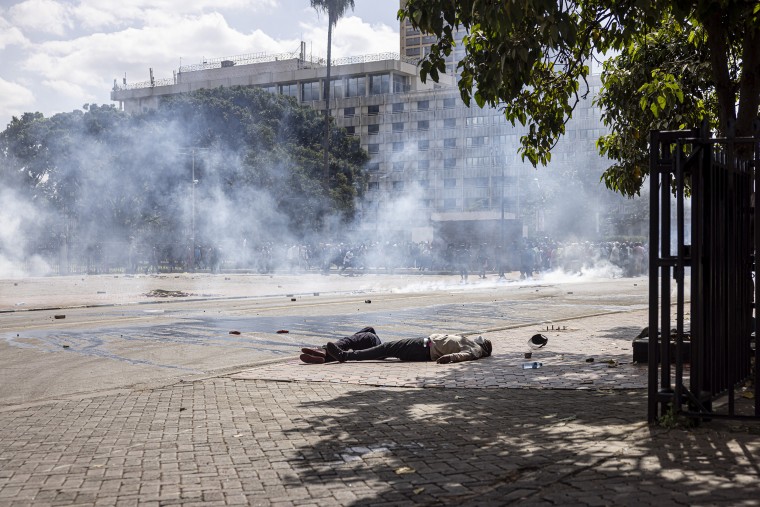Nick Westcott, an instructor of international relations at the London College of Oriental and African Research, said of Ruto’s announcement, “After the bloodshed, this is the only way to get people off the streets and show that he is a listening, caring Is the President.” Cancel Invoice. “The crowd may feel that they have driven him away, and I think he feels that unless he is held accountable, ‘Ruto must go’ may gain momentum.”
Ruto deployed the military on Tuesday to take control of the legislature, where videos showed protesters telling him to call in sick. In a televised address, he noted that Kenya “has experienced an unprecedented attack on its democracy” and that law-abiding protests have been “hijacked by a group of organized criminals.”
Meanwhile, the federal government began threatening media outlets covering the protests, with an internet watchdog reporting outages in the country. Diplomats from 13 countries, including the United States, said in a comment early Wednesday that they were “shocked” by Tuesday’s scenes and were “deeply concerned by allegations of kidnapping” by protesters.
Alex Vines, head of the Africa program at Chatham Space, said Ruto’s comments were “a knee-jerk reaction” as protests gathered momentum across the country, including in government-backed areas. “A president who promoted himself as the voice of the people has been vindicated by the rapid rise of a nationwide movement against him.”
The controversial tax plans were a key part of Ruto’s effort to turn around Kenya’s economy. He won power in 2022 by promising cheap fertilizer and relief from economic pain to poor Kenyans despite the country’s huge debt burden. However, early in his victory speech he acknowledged that “Clearly, we are living beyond our means.”
Earlier this week, the seeds of that contradiction came to fruition. MPs on Tuesday voted in favor of the finance bill which would have taken effect in July. Kenya’s public debt stands at 68% of GDP, higher than the 55% recommended by the World Bank and International Monetary Fund. The government has long aimed to reduce Kenya’s deficit by raising $2.7 billion in additional taxes, with the IMF creating additional funds contingent on meeting Nairobi’s revenue targets.

“It’s amazing how the thing going on among the crowd was, ‘This is something the IMF is imposing on us – why are they taking our money?’ The government clearly has not been effective in countering that narrative,” said Westcott, who is also a former director of the Royal African Society.
Historically, other countries in Kenya’s situation have decided to default on their debts – a move that makes it harder for a country to secure future international loans.
While the government made a U-turn on parts of the finance bill earlier this month – including tax hikes on bread, mobile banking services and car ownership – those concessions were not enough to appease the youth-dominated protest movement that has been wreaking havoc on social life. Have developed since. The media seems to lack specific leaders with whom the government can interact.
What became clear this week, however, was the depth of ill feeling toward the government and its plans. “More than 50% of our population under the age of 35 does not have a job,” Auba Obama, a Kenyan activist and half-sister of former President Barack Obama, told CNN. “We are taxing the unemployed and asking them to take loans. This is not correct.”
“Taxes are too high,” a protester in the coastal city of Mombasa told Reuters. “Our salaries are being taxed, and anything else you’re going to buy with your leftover money is being taxed, too.”

Kenya’s economic struggles in recent years have widened inequality in the country with a young population who have become disenchanted with the lavish lifestyles of Ruto and other politicians. During his victorious election campaign, Ruto portrayed himself as a ‘hustler’ ex-chicken vendor.
Ahead of Wednesday’s upset, Ruto faced some choices. While analysts had acknowledged that further bloodshed or negotiations with an unequal protest movement were possible options, few could have envisioned such a complete turnaround.
Westcott said, “Ruto may have to go back to the IMF and say ‘I need softer terms for your support.'”
Discover more from news2source
Subscribe to get the latest posts sent to your email.




